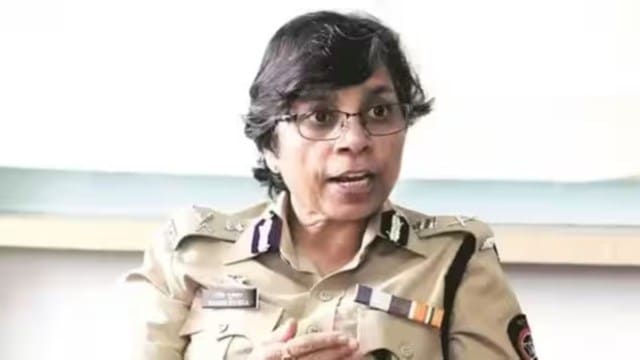New Criminal Laws Day 1: 224 FIRs filed in Maharashtra including 3 Zero FIRs and 8 online FIR applications, says DGP Rashmi Shukla
The three new laws have stringent provisions for crimes against women and children, body offences, national integrity, crime against armed forces, cyber crimes, communal crime (mob lynching), etc.
 Maharashtra DGP Rashmi Shukla (File Photo)
Maharashtra DGP Rashmi Shukla (File Photo)With the new criminal laws — the Bharatiya Nyaya Sanhita (BNS), the Bharatiya Nagarik Suraksha Sanhita (BNSS) and the Bharatiya Sakshya Adhiniyam (BSA) — coming into force on Monday, the Maharashtra Police said adequate measures have been taken for the effective and swift implementation of the new statutes. In an interview with Vijay Kumar Yadav, state Director General of Police (DGP) Rashmi Shukla explains how the new statutes are being implemented in Maharashtra. Excerpts:
How many offences have been registered in the state under the three new laws as of Monday?
In all, 244 FIRs have been registered in the state under the new laws (till 10.41 pm) on Monday. The first criminal case registered under the provisions of the new laws is in Ahmednagar taluka police station — FIR number 561/2024 under sections 309(4) and 3(5) of the BNS. The case is of a robbery (a property offence) with common intention filed against a few robbers at the police station. In Mumbai, the DB Marg police station registered the first FIR under the new provisions of the law under cyber crime provisions. The offence took place between June 26 and July 1.
Three of these (244) FIRs were filed as ‘Zero FIR’ at the Bhusawal GRP, Vardha GRP and Ahmednagar GRP police stations of the railway police and were transferred to the police stations concerned.
How do you see the new laws in comparison to the old laws?
Unlike previous laws, the new laws have stronger and stricter provisions. Earlier, legal provisions for sedition were not that strict; previous statutes didn’t cover mob lynching; now they are covered. They (the new laws) will put fear in the minds of criminals and help check crimes.
From the 511 sections of the Indian Penal Code, the BNS now has 358 sections. CrPC had 484 sections; now BNNS has 531 sections; the Indian Evidence Act had 167; while the BSA has 117 sections.
The three new laws have stringent provisions for crimes against women and children, body offences, national integrity, crime against armed forces, cyber crimes, communal crime (mob lynching), etc.
What measures have been taken to ensure swift and effective implementation of the three new criminal laws?
We started preparations for this since January this year. More than 25,000 policemen have undergone the training, and further training sessions would cover more personnel. As many as 74 short videos have been prepared to assist policemen; 258 master trainers have been regularly attending to policemen at the district and sub-divisional levels. Study material and soft copies have been handed over to the police station staff. Besides this, extensive training of the CCTNS operators and police station in-charge officers has been given regarding 23 new functionalities introduced by the National Crime Record Bureau (NCRB) system.
Every constable has a comparative chart (of sections and provisions of old and new laws).
There is also a 24×7 Helpline of NCRB — 14415 — for policemen to solve their doubts.
The new laws have new names and new sections. We have submitted 23 proposals for 23 notifications and rules for the Home department, out of which three have been issued. The rest will be issued soon.
The Home department is coordinating with the district-level prosecutions for the administrative structure of prosecutors in the district. The Home department is also coordinating with the MLCs (Medico Legal Cases) cases.
There will certainly be some errors during the initial implementation. But our intentions are clear. It’s a learning process. We are ready to meet all the challenges.
The new laws talk about compulsory visit of forensic experts’ teams to the crime scene for evidence collection. Is the state sufficiently equipped with the required resources to meet the provisions of the new laws?
With new laws, there is more thrust on technology and forensic science.
We have been given five years’ time for the gradual implementation of this. This may require resources, infrastructure, and technology spending worth around Rs 1,300 crore.
But, we have already started the implementation of the new provisions on a pilot basis in Navi Mumbai and Nagpur police commissionerates. In offences that have a punishment of more than seven years and are committed in these two cities, a forensic unit will compulsorily visit the crime scene.
How will the provisions for online FIRs work under the new statutes?
For online FIRs, the complainant or victim has to file an online complaint through the police’s web portal, and within three days they will have to appear before the police to sign their complaint and authenticate the same to turn them into FIRs. On Monday, we received eight online FIRs. For now, these would be treated as complaints and once the victims or complainants appear before the police and sign their complaints, they will be converted into FIRs.
Are steps being taken to ensure public awareness of the new criminal laws?
Yes. Several steps are being taken to create awareness among people. Today, all police stations across the state organised programmes at the police station level to create public awareness regarding the new laws. Awareness materials are being shared on social media platforms. Flex were put up, and pamplets were distributed to communicate the changes in a simple manner at the police station level.
The new laws focus on transparency and fair practice. Will this force the department to change the traditional style of policing?
Policing doesn’t mean that you always beat people. Policing means you have to perform your duty in a fair manner and help a citizen get his or her rightful justice.







